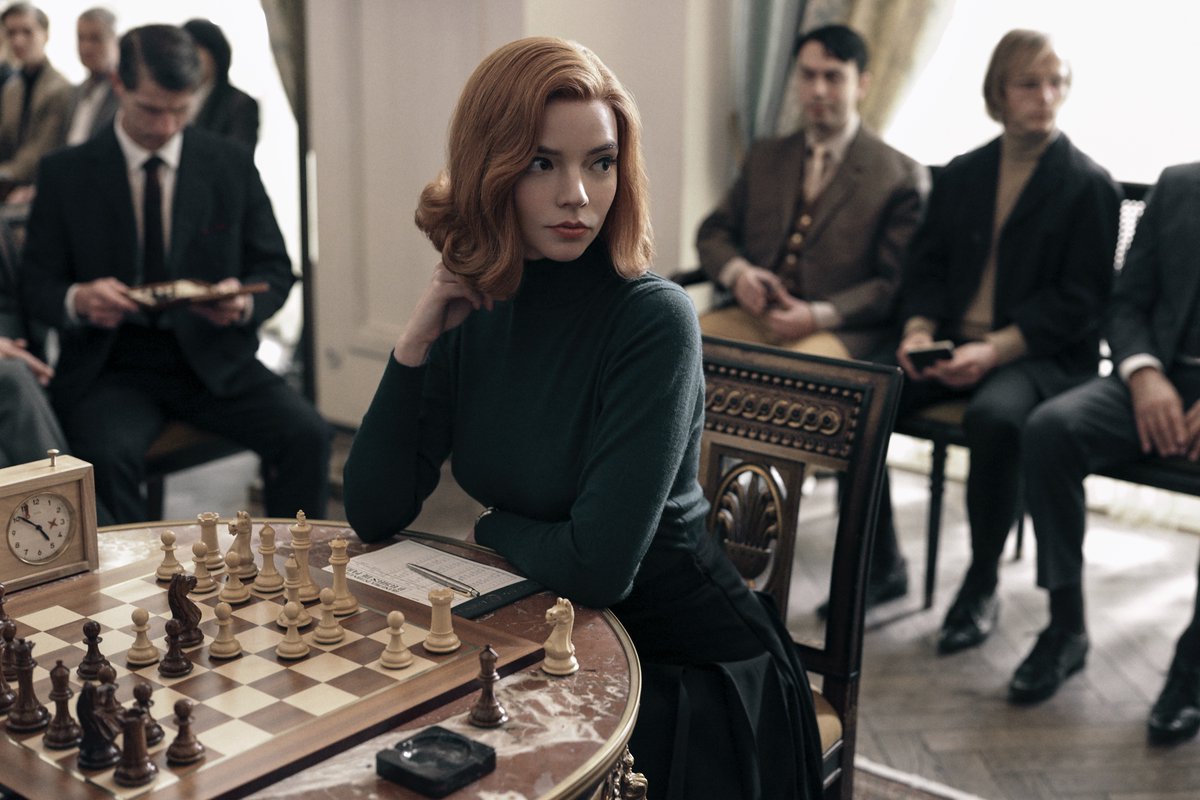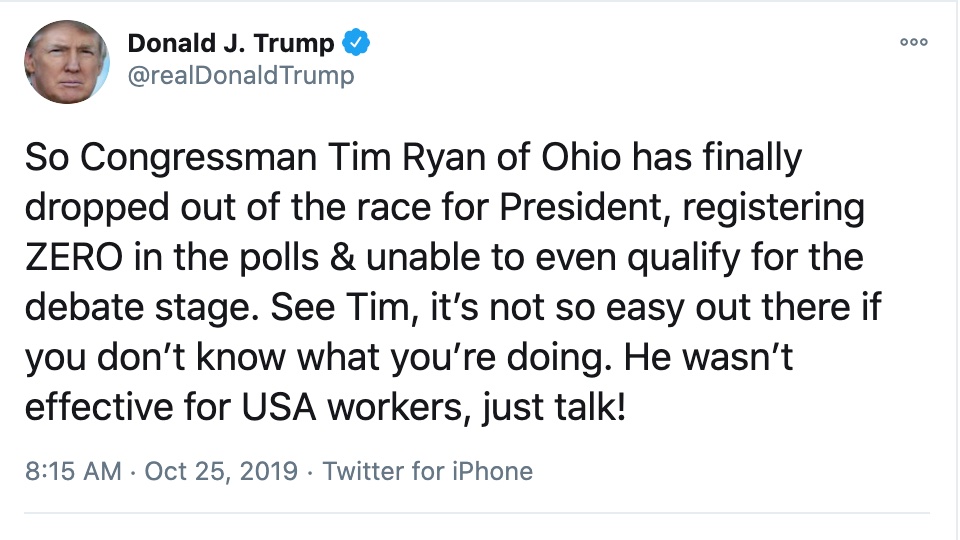
OK, so, I'm biased, but I can't remember the last time I had so much fun watching a show than I did binging @Netflix's "The Queens' Gambit". It is criminally short--just seven episodes--and I may threaten to cancel my subscription if they don't order a second season. (thread) 

Where do I even start with this show's brilliance? There's so much to discuss. First, let's get this out of the way: it's based on a 1983 novel of the same name by Walter Tevis, which was published to damn good reviews. I have not yet read it, and I plan to after the election.
The plot: a young girl loses her brilliant and troubled mother in a horrific car crash and learns how to play chess from a janitor in an orphanage. The orphans are being drugged. She develops a drug addiction. She gets adopted by a very troubled woman.
Despite a rocky childhood, she becomes a chess prodigy. Without giving anything away, the rest of the series is about three main things: 1) her drive to become world champion, 2) her addiction to pills and alcohol, and 3) being a woman who's among the very best "at a man's game".
But the undercurrent in all of this is her battle with loneliness and being untethered. She doesn't have a real family, and she struggles to gain a sense of stability in her independence. This drives her ambition, drives her addiction, and drives her sense of self.
Damn good plot, but how does it work with the chess part as the central engine? It is *notoriously* difficult to make chess accessible even in a standalone film, let alone a whole ass series. To put it plainly, @anyataylorjoy delivers brilliantly in the lead role as Beth Harmon.
It's very simple: @anyataylorjoy manages to grab your attention in every scene and effortlessly makes the viewer care about chess--even (and perhaps especially) those who don't know anything about the game. It's truly remarkable. You really feel her obsession with the game.
Moreover, it's the restraint and discipline in her character that constantly has the viewer trying to read her mind, only to be rewarded with flashes of vulnerability that make her seem all the stronger and more competent. I love this character. I want to *be* this character.
So, the book and movie are totally fictional. Although some famous real-life grandmasters are mentioned in the periphery, all the characters in the show are fictional. It is not based on a true story, sadly. Not even close. But it does borrow a lot from chess history.
Only one woman has ever been a contender for the world chess championship (also known as the "open" world chess championship for all players, since there's a women's world chess championship, too): Grandmaster Judit Polgar, ranked #8 in the world at one point.
It's not because women aren't just as good at chess but because historically, girls and women aren't encouraged to play chess. It's so often been framed as a game for men and boys. That's changed a lot, of course, but the gender gap in competitive chess still persists.
So, if 95% of competitive chess players are men, of course it's far, far less likely you'll see a woman reach the top ranks because of the smaller net cast. I like that the show referenced this directly but didn't dwell on it. They let her play do the talking. Smart.
Also on that note: the show does a great job of showing what it might look like if men just treated a woman in a male-dominated field as a peer. She's treated as a worthy opponent, good and bad. She's just another pro player. Again, smartly written.
The novel takes place in the '80s, but the timing of the series is in the 50s/60s + coincides w/ Bobby Fischer's rise through the professional ranks. He is not mentioned in the show, but there are SO many parallels. You can tell the writers borrowed heavily from his life.
Beth Harmon, much like Fischer, becomes a prodigy, wins her first U.S. Championship as a teen and hits her stride in the late '60s. Harmon, like Fischer, is considered the first truly great American player since Paul Morphy, who IS referenced in the show.
Harmon, like Fischer, has notable personal failings. Fischer was an egomaniac and anti-Semitic and racist and notoriously difficult (yeah, sorry, it's true: Bobby Fischer was a white supremacist dipshit). Harmon struggles with her drug addiction and alcoholism.
Both Harmon and Fischer are considered by the Soviets to be their equals. At the time, the USSR literally paid their pro chess players to train. These guys were like machines. "Genius" doesn't describe them. They stomped everyone. Harmon + Fischer put a stop to that.
But here's what's interesting: Fischer both respected and hated the Soviets. He had no problem bringing politics into his game. But Harmon just wants to beat them on the merits as worthy opponents. I *love* how the series handled politics in the show. Honestly, it was well done.
So, Harmon is basically supposed to be Bobby Fischer in that fictional timeline, except without his white supremacism and childish antics and political nonsense. It's also why he's probably not mentioned in the show despite being synonymous with chess in the United States - good!
Without giving anything away, I *love* how the writers handled adjourning games with the Soviets. Fischer would float conspiracy theories and accuse them of cheating, and Harmon just decides she's gonna beat them, cheating or not. So badass. I love her.
FINALLY... the show does an incredible job of portraying chess, which has a weird difficulty paradox. Chess is *really* easy to learn and within a day, a novice can learn how to play it fairly competently. But it gets exponentially harder the more you rise in the ranks.
So, any tournament player can teach a beginner how to play decently well in under 24 hours. And yet, the difference between an average grandmaster and the world champion is like the difference between a doctoral student and a Nobel Prize winner. For real.
All those scenes where they're reading books on chess theory and playing chess in their minds without a physical board and recreating entire board positions from memory and playing several people at once? For elite players, that's all real. They can do that. It's scary.
Competitive chess players will find some of the chess playing scenes a tad (just a little) corny in the context of their playing but not too much. It's a great balancing act. It looks authentic while keeping non-playing viewers emotionally engaged in the action.
ANYWAY, I absolutely love this show, and I'm dead serious, @Netflix: you need to order a second season, so that we can see what happens with @anyataylorjoy's character. This show is way too good for y'all to let it go. /thread
• • •
Missing some Tweet in this thread? You can try to
force a refresh





